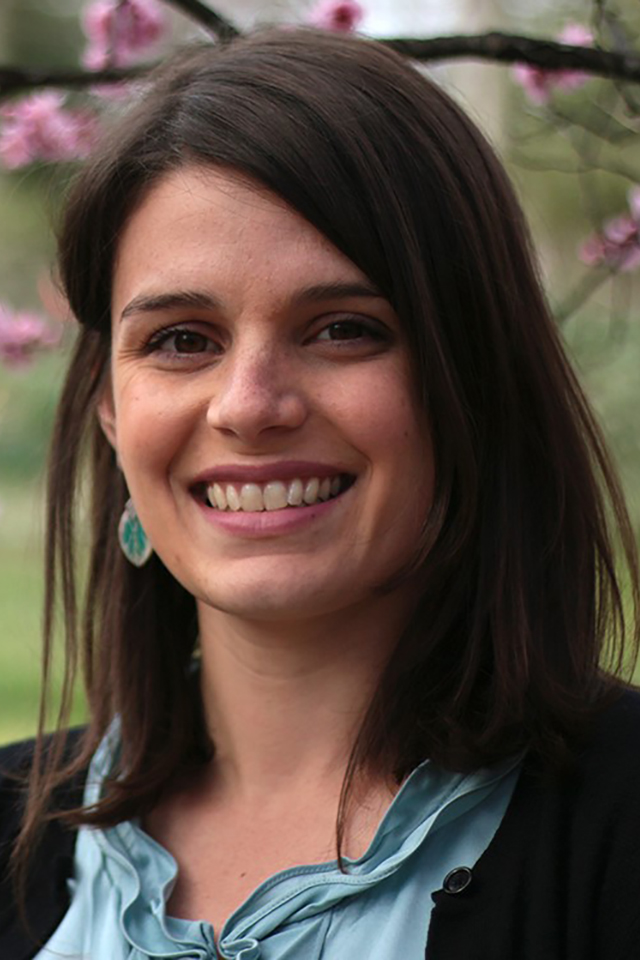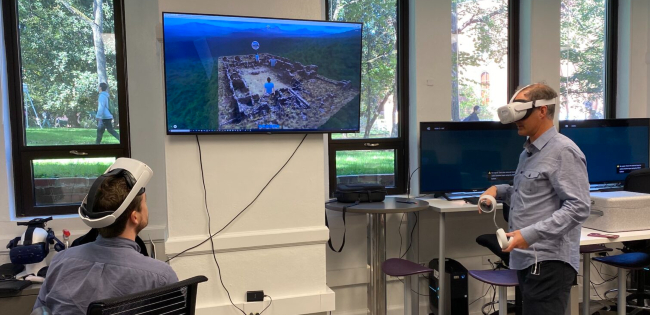With a prestigious new grant, archaeologist Ari Caramanica will explore what ancient people can teach us about dealing with the most pressing environmental issue of our time.
By Michael Blanding

Among the dry hills of the north coast of Peru are massive earth mounds that appear to be natural features. Archaeologist Ari Caramanica has revealed them to be something else: the remnants of large dams built by ancient peoples thousands of years ago to control runoff from catastrophic storms and irrigate the harsh desert landscape. With a prestigious new grant from the National Endowment for the Humanities, she will lead a multidisciplinary effort using archaeology and ethnography to understand these structures and how farmers might apply their lessons to deal with the modern-day challenge of climate change.
“We’re trying to uncover not just the tools and infrastructure, but also the conceptual logic and worldviews behind their implementation,” said Caramanica, an assistant professor of anthropology at Vanderbilt. “We think that’s of great value to policymakers, scientists and the public in facing the realities of climate change today.”
Peru’s north coast is extremely arid, with an average of less than 1.5 inches of rainfall a year. For more than 3,000 years, however, farmers have worked the land through an ingenious system of canals. Every six to 10 years, the El Niño weather pattern presents a different challenge with torrential storms that increase rainfall by up to 170 times, spurring flash floods that can erode the landscape.
By studying vestiges of ancient earthworks, Caramanica has demonstrated how ancient people harnessed this influx of water to help irrigate the area, breaking up its flow with dams to mitigate erosion and store water in the ground long term. Far from a disruption to their farming practices, they saw the El Niño system as a vital component in preserving them. In a recent trip to the region, Caramanica and her colleagues observed modern-day farmers making use of these structures as well. “After a recent rain event, they moved into the area just down the slope and set up artisan wells,” she said, an indication that such strategies can still work today, whether farmers realize they are using millennia-old human-made structures or not.
With the new NEH grant $145,159, she will lead a team using archaeological techniques to further investigate how ancient people created systems to control and harvest water amid the region’s extreme weather patterns. At the same time, her team—which includes an ethnographer from CUNY, a historian from Smith, an archaeologist from the University of Trujillo (in Peru), and a geomorphologist from the University of Arizona—will investigate records and conduct interviews with local farmers to better understand how they incorporate the massive earthworks into their own practices, providing a bridge between the ancient past and today.
Across the world, increasing temperatures are leading to both extreme drought and more ferocious storms. The principles behind these time-tested techniques, Caramanica hopes, could potentially be adopted by the Peruvian government in their creation of infrastructure to mitigate climate change and improve farmers’ livelihoods. At the same time, they could provide a model for other regions of how to search for and adopt ancient practices to address modern-day challenges. “The archaeological landscape is a repository of knowledge, developed over a long period of trial and error in adapting to the environment,” Caramanica said. “We can tap into that.”
Caramanica worked with Vanderbilt’s Research Development and Support team to apply for the NEH grant. Research Development and Support, based in the Office of the Vice Provost for Research and Innovation, helped Caramanica with the grant. RDS plays a pivotal role in bolstering the research ecosystem at Vanderbilt by offering internal funding, identifying external funding opportunities, providing proposal development assistance and organizing workshops and training for faculty. For more information about their services, email rds@vanderbilt.edu.


